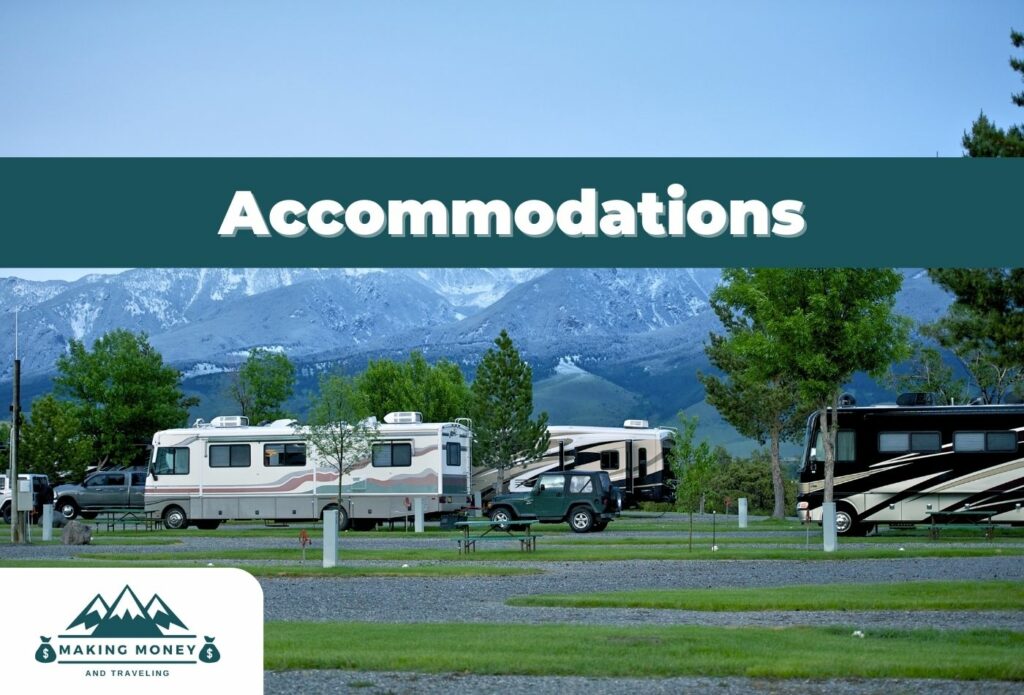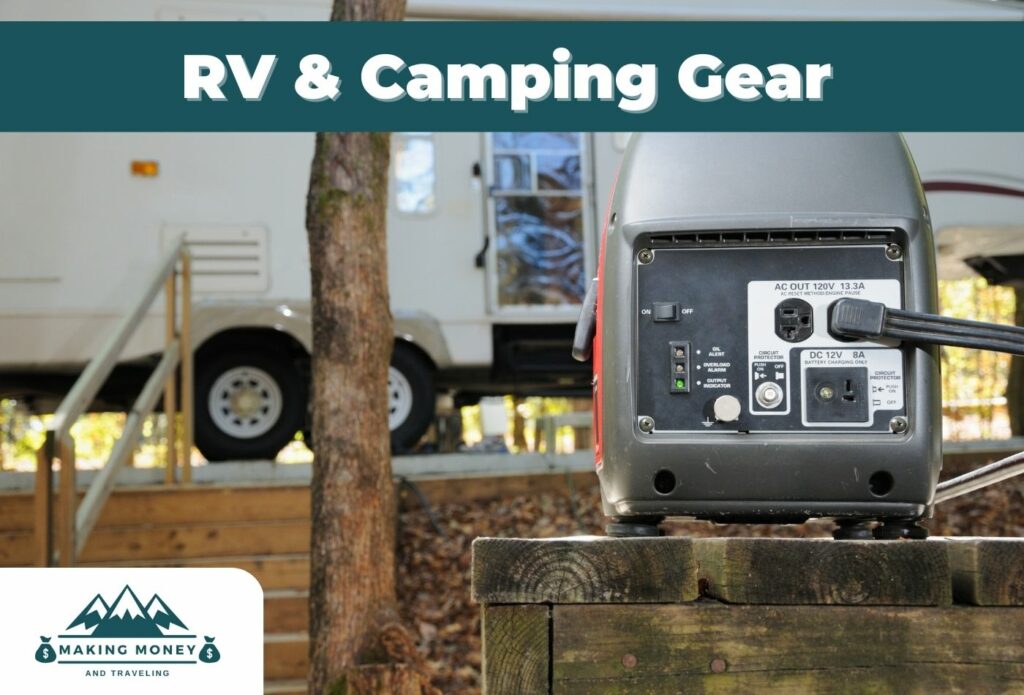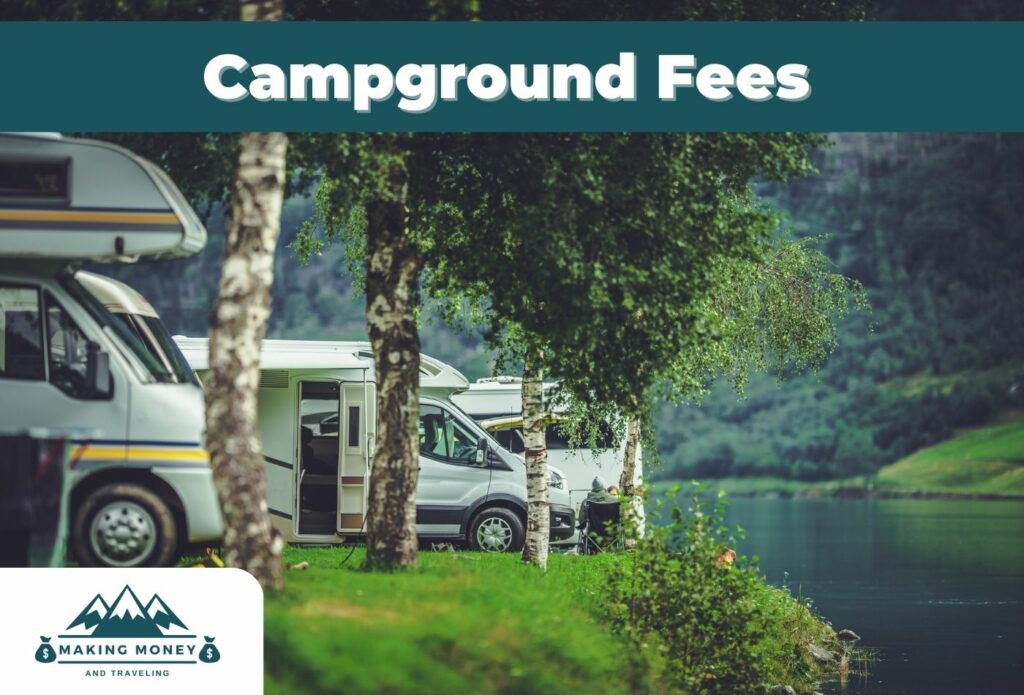As a digital nomad who has been living in an RV full-time for the past few years, I can attest to the many benefits of this amazing lifestyle.
From the freedom to explore new places to the simplicity of living with less, there are countless reasons why full-time RV living has become increasingly popular in recent years.
However, one question that often comes up when considering this lifestyle is whether or not it is affordable and the true cost of RV living.
In this guide, I'll break down the expenses associated with full-time RV living, provide real-life examples, and offer tips for budgeting and managing expenses. Let's get started!
Total Cost of RV Life
The average costs of living in an RV will vary based on your lifestyle, but I've broken it down for you to quickly analyze.
In general, plan to spend $2,000 to over $5,000 per month for full time RVing.
Obviously, this is a large range – but it really does depend on how you want to live.
| Expenses | Monthly Cost |
|---|---|
| RV Payment | $500 – $1,500 |
| Insurance | $100 – $300 |
| Gas | $500 – $1,200 |
| Propane | $20 – $30 |
| Campground Fees | $300 – $1,500+ |
| Food and Groceries | $500 – $800 |
| Entertainment | $100 – $300 |
| RV Maintenance and Repairs | $300 – $500+ |
| Internet and Phone | $100 – $250+ |
| Tolls and Parking | $0 – $100+ |
| Miscellaneous | $50 – $100+ |
| Total | $2,470 – $6,580+ |
Understanding the Costs of RV Life
If you plan to live in an RV, there are plenty of monthly costs you'll want to be aware of. Between campsite fees, gas and propane expenses, and RV maintenance – there's no shortage of expenses when it comes to RV living costs.
Accommodations

One of the biggest expenses you'll face when living in an RV full-time is the cost of accommodations.
While the price of an RV can vary depending on its size and features, the cost of staying in campgrounds and RV parks can add up fast.
Monthly fees for campgrounds can range from $300 to $1,500, depending on where you're staying and what amenities they offer.
For example, an RV park that offers many amenities like a laundry service or swimming pool is going to cost much more than a place without them.
Another important factor is the seasonality of some RV parks and campgrounds. Some private campgrounds will increase their camping fees around certain times of year when there is more demand.
Camping Gear

Even if you have all the amenities in your RV, it's always good to have some camping gear on hand for outdoor activities.
Some common camping gear items include tents, generators, heaters, composting toilets, sleeping bags, camp chairs, tables, and coolers.
The cost of camping gear can vary depending on the quality and brand, but it's possible to find affordable options that are still durable and reliable.
It's worth noting that this is more of a one-time cost, rather than a monthly cost – so you won't necessarily have to add this into your ongoing budget.
Check out these amazing RV storage ideas that can save space in your vehicle!
RV Payments
If you've financed your RV, you'll need to budget your monthly payment into your finances.
Just like a car payment, the monthly cost of financing an RV can be extremely costly.
If you've purchased a newer model or an RV that's loaded with features, your RV costs can exceed $1,000 a month.
If you've opted for a used model or a camper without all of the bells and whistles, you might be able to finance your vehicle for $400 to $800 per month.
Gas and Fuel Costs
Another expense that can really add up when you're living in an RV full-time is the cost of gas or fuel.
How much you'll need depends on a few different things – like how big your RV is, how far you're traveling, and how often you're hitting the road. But as a rough estimate, remember that a bigger RV will use up more gas. Plan on budgeting around $500 to $1,200 per month for gas expenses on average.
Propane Expenses
When it comes to RV living, propane is an essential commodity for powering up various appliances.
The amount of propane required for your RV can depend on different factors, including the size of your RV, the number of appliances you use, and the weather conditions you encounter.
Typically, you may have to spend around $20 to $30 per month on propane costs, but this can vary depending on how often you use it and other factors. For example, if you're living in a cooler climate and prefer a warm RV – plan to spend more on propane than you would living in a mild climate.
Additionally, the price of propane can fluctuate just like gas prices. So if propane prices are higher, don't be surprised.
RV Insurance
RV insurance is just one of several expenses that come with RV life. Just like with a regular home, you'll need insurance for your RV.
The cost can vary depending on the type and age of your RV, as well as your driving history. Generally speaking, you can expect to pay anywhere from $100 to $300 per month for insurance.
RV Maintenance
Another expense you'll need to factor in is maintenance on your RV.
RVs require regular upkeep, like oil changes and tire rotations, and unexpected repairs can pop up too. On average, you should budget around $300 to $500 per month for maintenance and repairs.
The truth is, RVs are different than cars in that they require more maintenance and repairs than a regular vehicle.
Check out the video below to understand the most important maintenance you need to do on yuor RV!
Food Expenses
Food expenses can also be a bit tricky when living in an RV full-time.
Limited space means limited storage, which can make stocking up on groceries challenging. Eating out can also add up quickly. As a ballpark figure, expect to spend around $500 to $800 per month on food.
One hack I've used to save money on my food budget is taking advantage of local farmers' markets and roadside stands to find fresh, locally sourced produce.
Phone and Internet
Finally, you'll need to think about phone and internet costs. While some RV parks offer free Wi-Fi, it's not always reliable or fast. You may need to invest in a mobile hotspot or satellite internet service, which can be expensive. Plan to spend around $100 to $250 per month on phone and internet expenses.

Download this FREE ebook learn 60+ ways to earn an income from anywhere!
Additional Costs to Consider
In addition to the primary expenses outlined above, there are several additional costs to consider when living in an RV full-time. These include health insurance, equipment, and upgrades.
Health Insurance
Health or medical insurance is another cost that can be expensive if you're self-employed.
While many companies will offer more affordable private health insurance if you decide to work for yourself as I have, be prepared.
I currently pay $400 per month for a high deductable plan that covers 2 people. There are plans that can easily cost over $1,000 a month for better coverage.
If you have a family with more than 2 people, you can expect to pay at least $1,000 a month for health insurance.
Campground Fees

While campground fees were included in the accommodations section, it is important to note that some RV parks charge additional fees for amenities such as swimming pools, laundry facilities, and other services. These extra charges can be anywhere from a few bucks to a few hundred per month, so be sure to factor that in when planning your budget.
It's worth noting that not all of these costs aren't required, so if you're looking to save some money on your RV lifestyle you can avoid them.
Equipment and Upgrades
Another cost to consider is equipment and upgrades.
Depending on how old your RV is and what condition it's in, you might need to invest in upgrades like solar panels, new batteries, or a new generator.
You might also need to buy gear like a tow vehicle or a bike rack.
All of that can add up fast, so budget a few hundred dollars each month for new equipment.
Entertainment Costs
Some RVers prefer to spend time outdoors hiking, fishing, or enjoying other outdoor activities, which can be relatively low-cost or free.
Others may prefer to visit attractions or participate in paid activities, such as museums, amusement parks, or concerts, which can add up quickly.
It's important to factor in entertainment costs when planning your budget for full-time RV living so that you can enjoy your travels without breaking the bank.
I always save a couple hundred dollars a month for entertainment costs but there are plenty of free entertainment options out there if you're on a budget.
Tolls and Parking
Tolls and parking fees can be an unexpected expense when RVing.
Many toll booths have a separate lane for larger vehicles, and the tolls can be higher for RVs than for cars. In addition, parking fees can add up quickly, especially if you're visiting a popular tourist destination. It's a good idea to research tolls and parking fees in advance so you can plan your route and budget accordingly.
Pet Costs
Bringing a pet along on your RV adventures can be a wonderful experience, but it's important to keep in mind the added costs.
You may need to pay for pet deposits or fees at campgrounds or RV parks, as well as any necessary veterinary care on the road. Additionally, you'll need to budget for food, treats, and supplies like toys or bedding. These costs can add up quickly, but the joy and companionship that a pet can bring on your travels may make it worth it for some RVers.
Real-Life Examples of Full-Time RV Living Costs
Now that we have broken down the expenses associated with full-time RV living, let’s take a look at some real-life examples. Keep in mind that these costs will vary depending on several factors, including the size and amenities of your RV, your travel frequency, and your location.
Example 1 – Minimalist RV Living
Here's a breakdown of a minimalistic way to live in an RV. Monthly expenses include:
- Accommodations: $500
- Gas: $700
- Insurance: $150
- Maintenance: $300
- Food Expenses: $500
- Phone and Internet: $100
- Total Monthly Expenses: $2,250
Example 2 – Luxury RV Living
Here's a breakdown of a more luxery way to live in an RV. Monthly expenses include:
- Accommodations: $1,500
- Gas: $1,000
- Insurance: $300
- Maintenance: $500
- Food Expenses: $800
- Phone and Internet: $200
- Total Monthly Expenses: $4,300
Check out the video below for more info on the costs of RV life!
Comparing the Cost of Full-Time RV Living to Traditional Housing
Now that we have a better understanding of the costs associated with full-time RV living, let’s compare them to the cost of traditional housing.
According to the LendingTree, the average American spends $5,111 per month on expenses. This includes mortgage or rent, utilities, and other related expenses.
While the cost of full-time RV living can vary greatly depending on several factors, it is safe to say that it can be much cheaper than traditional housing. However, it is important to note that there are trade-offs. Living in an RV full-time requires a certain level of flexibility and adaptability, and it may not be suitable for everyone.
Is Full-Time RV Living Realistic for Digital Nomads and Retirees?
Full-time RV living can be an attractive option for digital nomads and retirees who are looking for a more flexible and adventurous lifestyle.
With the ability to work remotely and the freedom to travel, full-time RV living can offer a unique and rewarding experience.
However, it is important to consider the challenges associated with this lifestyle, including the need for self-discipline and the need to manage expenses carefully.
Tips to Saving Money While Living in an RV Full-Time
While full-time RV living can be an affordable option, it is important to find ways to save money wherever possible. Here are a few great ways to save money on your RV living costs!
Consider Boondocking
If you live in an RV, the chances are you know what boondocking is.
But if not, boondocking involves camping in remote areas without any hookups, such as electricity, water, or sewer, which means you won't have to pay for expensive campground fees.
It allows you to immerse yourself in nature, away from the hustle and bustle of crowded campgrounds. However, it's important to prepare for the challenges that come with boondocking, such as the need to conserve resources and ensure your safety while camping in remote areas.
Consider National and State Parks
Staying at state and national parks can be a cost-effective way to enjoy RV life. These parks often offer beautiful scenery, hiking trails, and other outdoor activities at a fraction of the cost of private RV parks. Additionally, some state and national parks offer amenities such as water and electric hookups, making it easier to live comfortably while on the road. However, it's important to note that popular parks can fill up quickly, so it's important to plan ahead and make reservations in advance.
How to Afford to Live in an RV
Make a Budget and Know Your Expenses
Listen, I'll be the first to tell you how much of a pain budgeting is. But it's critical when choosing to live in an RV.
To make a budget you'll start by analyzing both your income and expenses. You can look back through your bank account and credit card history to find out how much you've been spending each month so you can budget more effectively.
Next, take a look at your income. This should include your total income from any work you do.
If you're in the red after subtracting your monthly expenses from your income, it's time to adjust.
You'll need to either reduce your costs or increase your income until you're in the green.
Find a Side Hustle
If you enjoy RV travel but the costs seem too high, finding a side hustle can be a great way to make a bit of extra money.
I recommend finding a digital side hustle, so you don't have to sacrifice the RV lifestyle while earning some extra cash.
The money you make from your side hustle can help cover your RV living costs and give you the freedom to travel more often.
Take Advantage of Free Camping Spaces
Camping costs and RV park fees can be some of your largest expenses when it comes to RV travel. To save money, take advantage of free camping spaces.
There are a variety of ways to find free camping spots, such as using apps like Campendium or FreeCampsites.net. These platforms allow you to search for free camping spots near you, so you can save money while still enjoying the RV life.
Final Thoughts on The Cost of Full Time Rving
Full-time RV living can be an affordable and rewarding lifestyle for those who are willing to embrace the challenges and benefits that come with it. By understanding the costs associated with full-time RV living, finding ways to save money, and managing your expenses carefully, you can enjoy the freedom and flexibility that this lifestyle has to offer.
If you are considering full-time RV living, be sure to do your research, talk to other RVers, and carefully consider whether this lifestyle is right for you.

Forrest McCall
Forrest is a passionate traveler who loves to explore different cultures and lifestyles.
Download this FREE ebook learn 60+ ways to earn an income from anywhere!